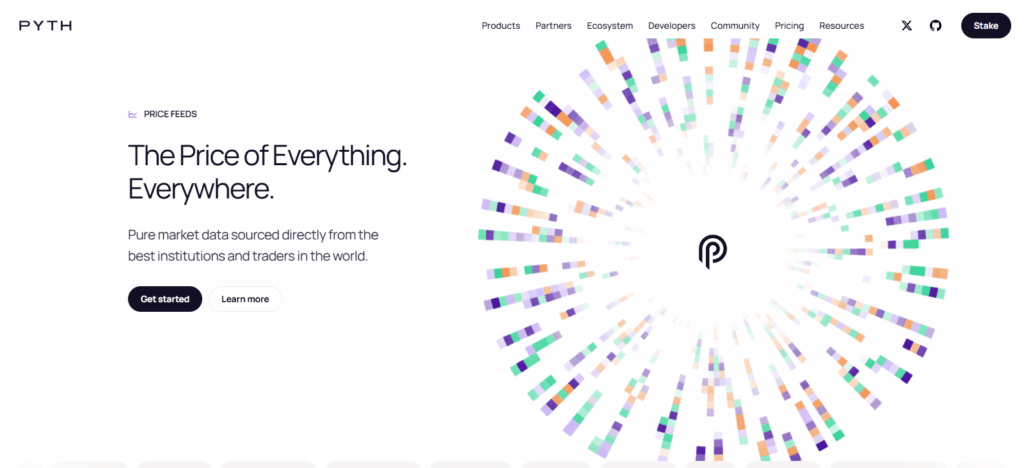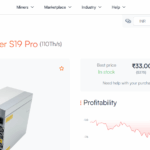This article will discuss how Pyth Network powers real-time data for DeFi and changes how decentralized finance platforms access and leverage market data.
Pyth delivers rapid, precise, and reliable data directly from vetted finance sources, enabling DeFi applications to function effectively, minimize risk, and uphold transparency within and across blockchains.
Understanding Pyth Network
Pyth Network provides a high-performance oracle solution that supplies real-time, extremely accurate market data to blockchain applications, especially in decentralized finance (DeFi).
Unlike traditional oracles that use single data points or suffer significant latency issues, Pyth minimizes real-time latency issues in data aggregation by combining feeds from several trusted data providers in finance, trading, and exchange markets.

Pyth optimized its infrastructure for speed and provides DeFi applications with near real-time, up-to-the-millisecond price information necessary for highly volatile trading activities on decentralized exchanges, for use in lending and derivatives trading.
Pyth secure data pipelines and on-chain smart contracts in conjunction with a decentralized data provision network minimizes price data risk manipulation and downtime. Linking on-chain blockchain ecosystems with off-chain real-world financial data provides DeFi operations with no latency, increased automation, and responsive smart contracts.
Pyth Network cross-chain interoperability increases its use and provides an oracle solution foundation for decentralized applications in virtually all blockchain ecosystems.
How Pyth Network Powers Real-Time Data for DeFi

Example: Updating Token Prices on a DEX Using Pyth Network
Step 1: Gathering Data From Trusted Sources
For example, multiple sources of real time price Pyth Network gathers data from trading firms, exchanges, and liquidity providers. Pyth Network gathers BTC/USD prices from multiple top crypto exchanges. Having multiple sources allows Pyth Network to confirm price accuracy and reliability.
Step 2: Data Aggregation and Validation
Multiple sources provide raw price data. Pyth aggregates the data and applies verification, applies filters to remove anomalies, noise, and consensus calculates a price. This ensures the data reflects market conditions.
Step 3: Secured Transmission to the Blockchain
Validated data is sent real time onto the blockchain via Pyth’s oracle infrastructure. This secured data is sent within latencies of milliseconds, which means DeFi platforms are receiving new price data in real time.
Step 4: Integration With DeFi Smart Contracts
Contracts are programmed on the DeX to read Pyth price feeds. This data allows the contracts to automate token price updates and real time data to swap rate calculations and the liquidity pools.
Step 5: Execution for Users in Real-Time
Users of the DEX can check prices for tokens promptly, helping them execute instant swaps and trades well below the risk of stale, manipulated prices and eliminating the risk of arbitrage.
Step 6: Updates without Intervals
Spend Pyth Network continues to send prices even when markets change, making adjustments to the DEX smart contracts so that the DEX users always interact with the most precise data available.
How Pyth Network Works
Data Sources and Collection
- Pyth collects real-time data on finances and the crypto market from reputable trading firms, data exchanges, and liquidity providers.
- Both centralized and decentralized exchanges are used as sources to guarantee precision.
Data Aggregation
- For every asset, the network collects and consolidates numerous price feeds.
- Consensus and validation algorithms are utilized to isolate and filter anomalies to ensure reliability.
Data Verification and Integrity
- Pyth validates data of the input feeds to ensure data is not erroneous and is not manipulated in any way.
- Data integrity is guaranteed through the use of cryptographic signatures and secure data pipelines.
Movement to Blockchain
- Validated feeds of data are sent through Pyth’s decentralized oracle network to the blockchain.
- This facilitates near real-time updates and significant reductions in latency.
Access in DeFi Protocols
- DeFi platform’s smart contracts (DEXs, lending protocols, derivatives etc.) use oracle feeds from Pyth to fetch interchain data.
- This allows for real-time automatic updates of trading actions, collateral values, token prices, and overall execution of trades.
Benefits of Using Pyth Network
Real-Time Data Delivery
Offers price updates every millisecond, which is necessary for the fast paced DeFi market.
High Accuracy
Data is aggregated from multiple trusted sources to provide users with accurate data.
Enhanced Security
Proven manipulation and fraud L, is done via cryptographic and secure pipeline verification.
Reduced Risk of Stale Data
Protects traders and protocols by minimizing risks with obsolete market data and reducing errors caused by stale data.
Seamless DeFi Integration
Smart contracts can access Pyth feeds for price, collateral and trading processes.
Cross-Chain Compatibility
Supports multiple blockchains and allows DeFi applications to obtain high-quality data from a variety of networks.
Improved Efficiency for DeFi Protocols
Automated frameworks can execute trades faster, collateralize accurately and persist reliable strategies.
Transparency and Trust
Data is aggregated from trusted sources that are transparently validated to guarantee the users and developers’ trust.
Scalability
Lends to fast support for large volumes of data from a myriad of assets which growing DeFi ecosystems.
Supports Innovation
Enables the construction of sophisticated DeFi offerings like real-time lending, derivatives, and self arbitrage closing.
Key Features of Pyth Network
High-Fidelity Market Data
To retrieve the most accurate and trustworthy data, Pyth Network gathers price data straight from the most reputable trading businesses and financial exchanges and from Market Makers.
Real-Time Feeds
For applications in DeFi, such as trading and derivatives that need to work at a fast pace, the service offers active and instant data refreshes where updates happen several times per second.
Decentralized Oracle Network
Networked data servers are utilized to cover every conceivable point of failure.
Cross-Chain Compatibility
The service offers integration to various DeFi Systems as it can work with numerous blockchains at the same time.
Trust and Data Proofing
Data is safeguarded with cryptographic techniques to ensure originality and prevent unauthorized alteration.
Aggregate and Consensus System
Various pricing inputs are fused together to form an output which is a comprehensive price feed and consolidated with a consensus.
Low Latency and High Performance
Services in Pyth are optimized to ensure they respond to market shifts quickly and to provide instant updates.
Scalability
Services are aimed to provide fast and responsive data.
Trust and Transparency
The DeFi community can view and assess the data generation and updates to reinforce confidence in the system.
Challenges and Considerations
Dependence on Data Providers
Pyth depends on the quality and truthfulness of its data sources. If data providers report inaccurate or dishonest data the data feed will be affected.
Network Security Risks
Like any other oracle system, Pyth must protect itself from potential attacks such as manipulation of data that will result in compromised prices.
Scalability Under High Load
Pyth must be able to support the architecture that will maintain the real time data from several markets. Latency and downtime are serious issues to avoid.
Cross-Chain Complexity
The support of several blockchains leads to issues on inter blockchain network security and the consistency and synchronization of data.
Gas Fees and On-Chain Costs
High frequency on-chain data updates will raise gas fees even more, which disproportionately affects smaller DeFi projects.
Regulatory and Compliance Factors
The global regulation that will impact the deployment of decentralized data systems, will also impact the elimination or enforcement of data usage policies.
Latency in Extreme Market Conditions
Extreme market volatility or rapid trading activity will always result in some slight delays in data updates.
Future of Pyth Network in DeFi
Pyth Network remains a leader in real-time data provision in decentralized finance. Pyth is foundational infrastructure for global DeFi protocols given the need for precise, low-latency market data. Pyth Network “broadens the horizons” of data provision beyond crypto market prices to include provisions for commodities, equities, and macro indicators.
Development improvements in cross-chain data interoperability empower users in building innovative financial instruments.
Complex and real-time financial instruments enable rapid response to real-world changes. Community driven on-chain governance enhances Pyth Network and DeFi protocols security and reliability, building the systems trustworthiness as the system matures.
DeFi growth and the integration of Pyth Network with real-world data proves Pyth Network is innovative and reliable. Pyth Network enhances the global financial ecosystem by proving the system is scalable and emphasizes the integration of on-chain and real-world applications.
Conclusion
Pyth Network is revolutionary in DeFi because it addresses one top problem in DeFi: real-time accurate market data. Pyth connects trusted data sources to M. The Decentralized Oracle system provides transparent, timely, and trusted financial data to blockchain applications.
Pyth boosts the operational efficiency, risk control, and DeFi platforms stability through high-fidelity price feed. With the growing ecosystem, the Pyth Network will remain the core and key revolutionary systems in decentralized financial systems, especially with present cross-chain development and ongoing innovative systems.-
FAQ
How does Pyth Network provide real-time data?
Pyth aggregates price data from multiple verified sources, validates it for accuracy, and securely transmits it to blockchain smart contracts—allowing DeFi platforms to access up-to-the-second market information.
Why is Pyth Network important for DeFi?
DeFi applications depend on accurate price feeds for trading, lending, and risk management. Pyth ensures these platforms get fast, reliable, and tamper-proof data, reducing errors and improving overall performance.
Which DeFi platforms use Pyth Network?
Many top DeFi platforms and exchanges integrate Pyth data feeds, including protocols operating on Solana, Ethereum, and other major blockchains. The network continues to expand its ecosystem partnerships.
What makes Pyth different from other oracle networks?
Unlike traditional oracles that rely on public APIs, Pyth sources data directly from professional market participants, offering higher accuracy, lower latency, and better data integrity.
Is Pyth Network cross-chain compatible?
Yes. Pyth supports multiple blockchains through its cross-chain data delivery system, enabling DeFi applications across networks to access the same verified data seamlessly.









